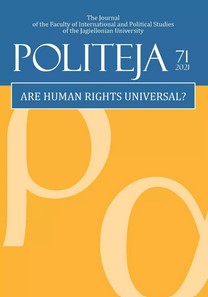THE UNDERSTANDING OF HUMAN RIGHTS IN THE NEO-EURASIANIST DOCTRINE
THE UNDERSTANDING OF HUMAN RIGHTS IN THE NEO-EURASIANIST DOCTRINE
Author(s): Joachim DiecSubject(s): History of Law, Human Rights and Humanitarian Law, Civil Society, Politics and law, Comparative politics, Comparative Law
Published by: KSIĘGARNIA AKADEMICKA Sp. z o.o.
Keywords: Eurasianism; human rights; Russia; Eurasia; Kazakhstan;
Summary/Abstract: Neo-Eurasianism as a political doctrine is a descendant of the Eurasianist thought in the interwar period and L.N. Gumilev’s ethnological speculations during the Soviet era. Similarly to the oldest generation, Neo-Eurasianists, respond to the trauma of the lost empire in their thought: denying the leading position of the victorious competitor, they also deny the Western understanding of human rights. The polemic is conducted by a group of Russian visionaries, such as A. Panarin, A. Dugin, V. Korovin, as well as by much more pragmatic Kazakh theoreticians of law led by Z. Busurmanov. The Neo-Eurasianist narrative generally rejects the Lockean absolutization of inalienable individual’s rights and emphasizes the communitarian aspect instead. Russian Neo-Eurasianists blame the Western ideologists for treating human rights as a diplomatic weapon against foreign independent powers and try to present the liberal concept as a speculative idea. However, contrary to the Russian tradition, the idea of individual rights is not rejected in the Kazakh legal theory; it is presented in the light of a necessity to protect the right to cultivate one’s identity in the realities of a multiethnic state.
Journal: Politeja - Pismo Wydziału Studiów Międzynarodowych i Politycznych Uniwersytetu Jagiellońskiego
- Issue Year: 18/2021
- Issue No: 71
- Page Range: 115-137
- Page Count: 23
- Language: English

